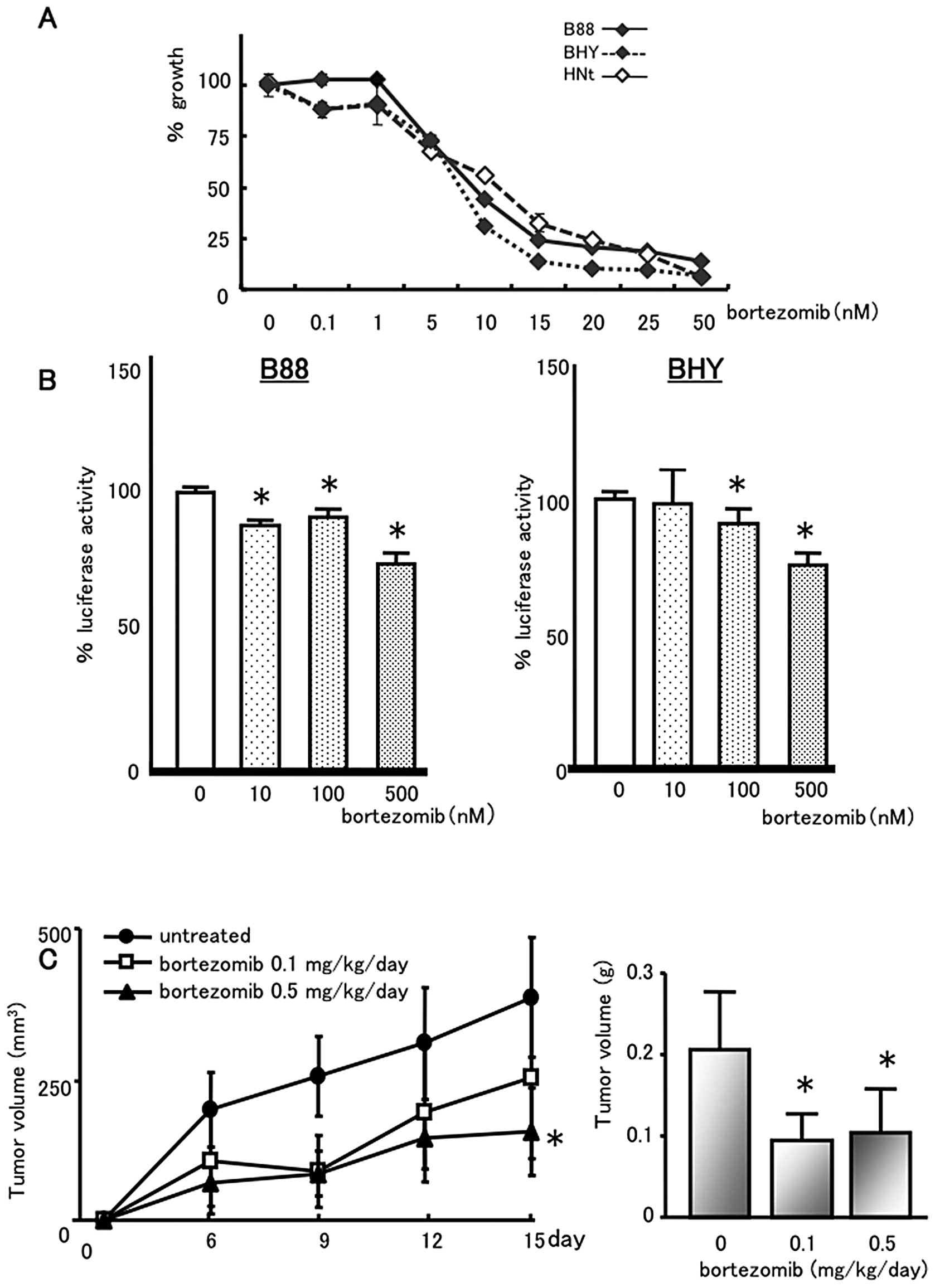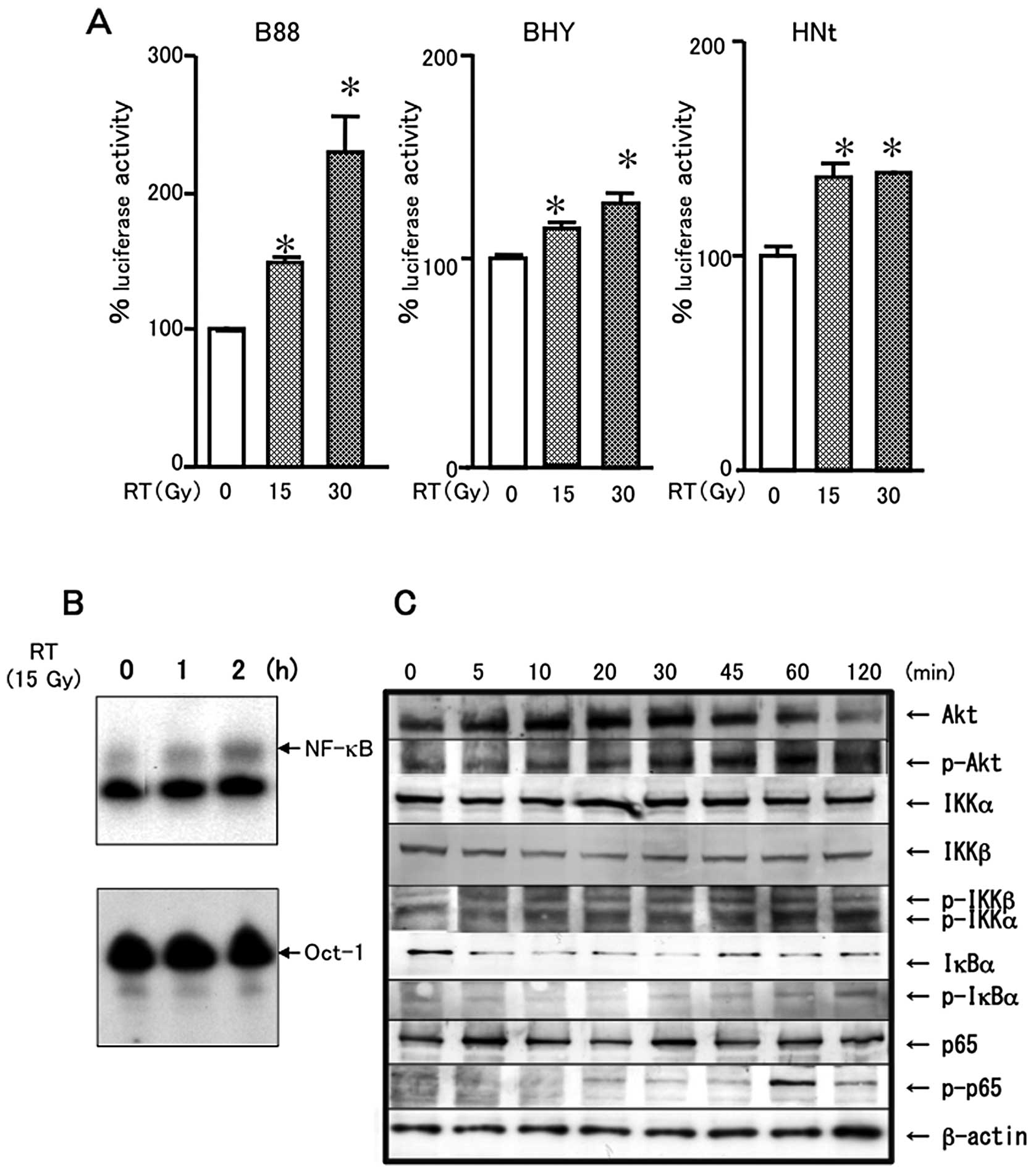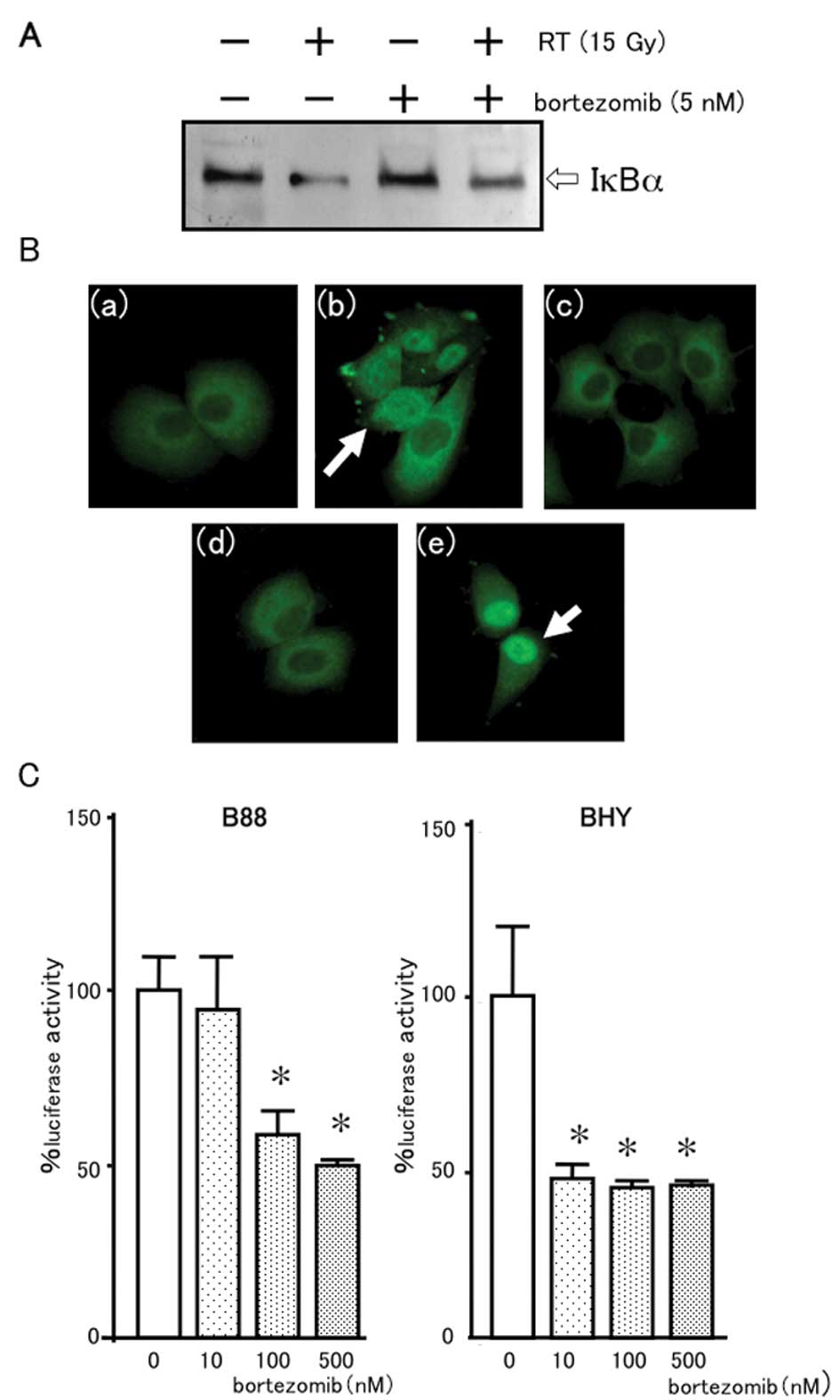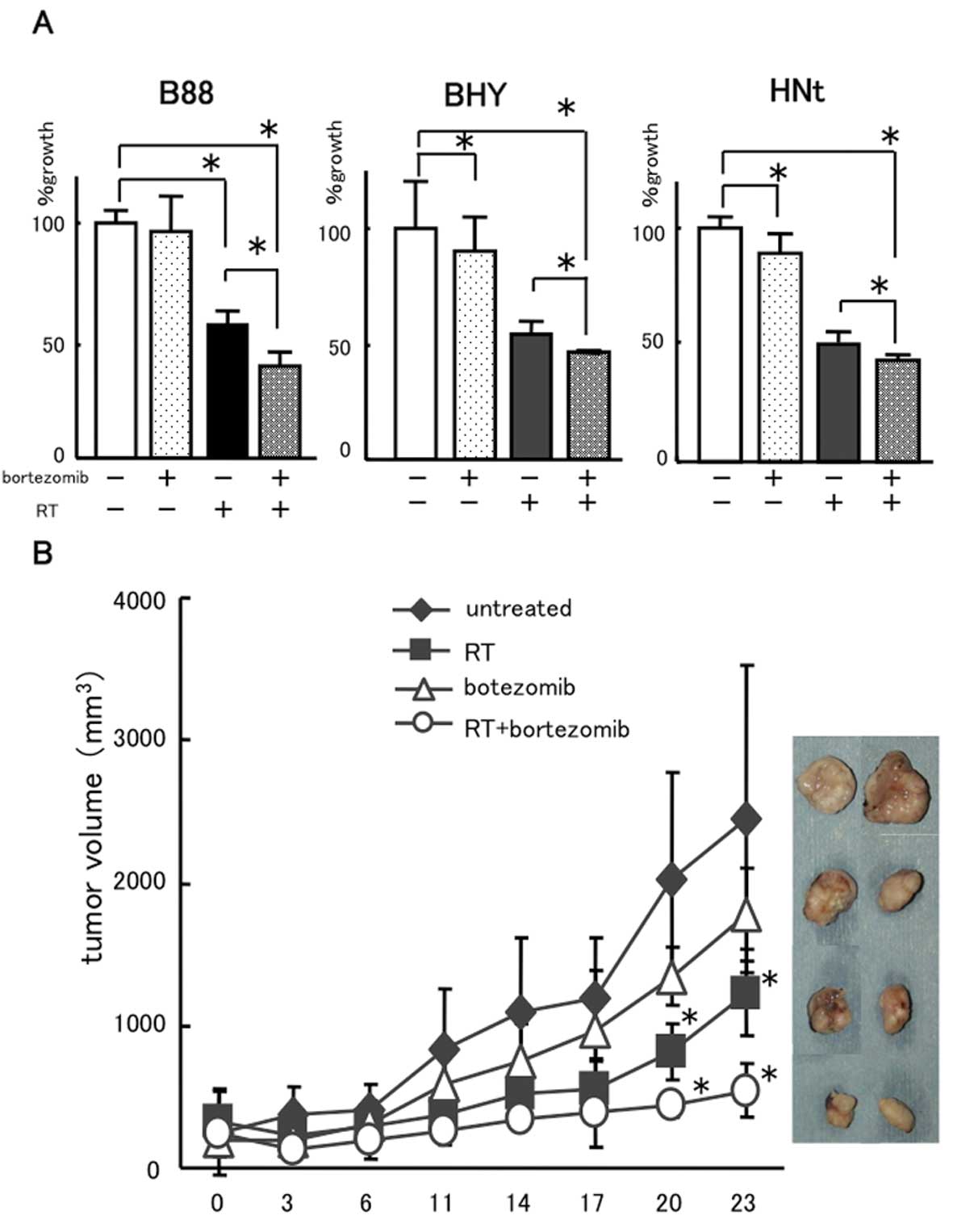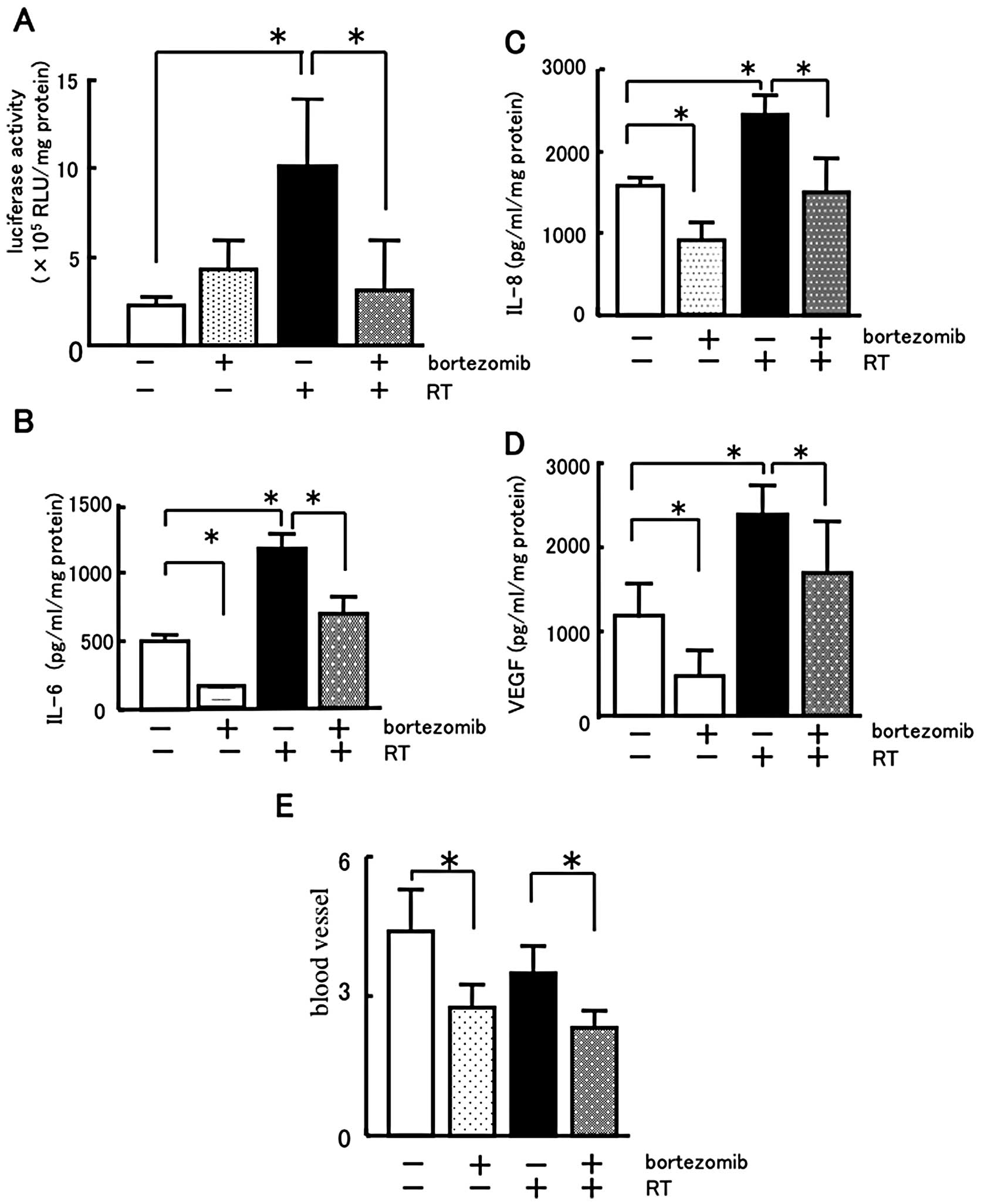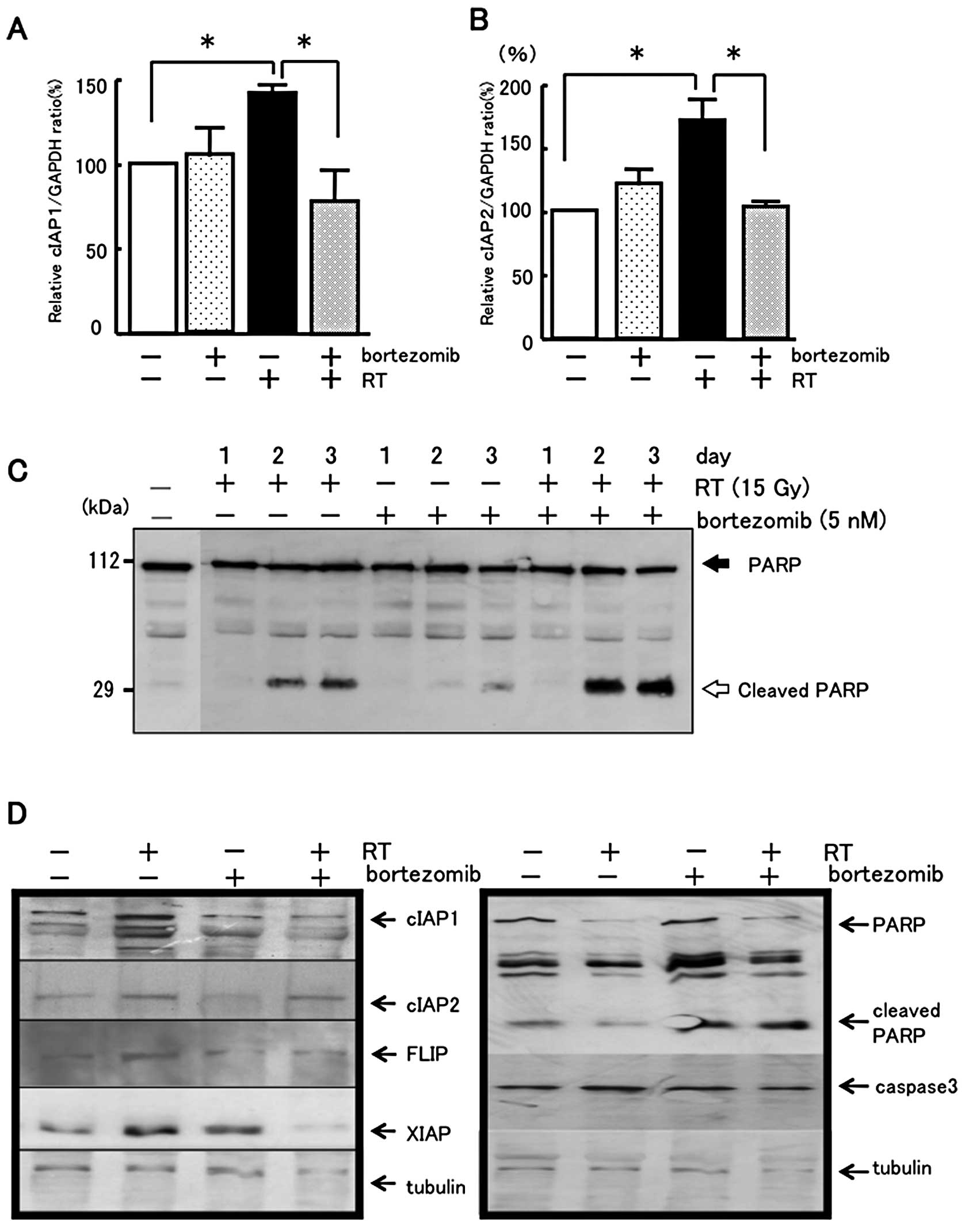|
1
|
Sen R and Baltimore D: Multiple nuclear
factors interact with the immunoglobulin enhancer sequences. Cell.
46:705–716. 1986. View Article : Google Scholar : PubMed/NCBI
|
|
2
|
Baeuerle PA and Baltimore D: NF-kappa B:
ten years after. Cell. 87:13–20. 1996.PubMed/NCBI
|
|
3
|
Yamamoto Y and Gaynor RB: IκB kinases: key
regulators of the NF-κB pathway. Trends Biochem Sci. 29:72–79.
2004.
|
|
4
|
Van Antwerp DJ, Martin SJ, Kafri T, Green
DR and Verma IM: Suppression of TNF-alpha-induced apoptosis by
NF-κB. Science. 274:787–789. 1996.
|
|
5
|
Traenckner EB, Pahl HL, Henkel T, Schmidt
KN, Wilk S and Baeuerle PA: Phosphorylation of human IkappaB-alpha
on serines 32 and 36 controls Ikappa B-alpha proteolysis and
NF-kappa B activation in response to diverse stimuli. EMBO J.
14:2876–2883. 1995.
|
|
6
|
Karashima T, Sweeney P, Kamat A, et al:
Nuclear factor-κB mediates angiogenesis and metastasis of human
bladder cancer through regulation of interleukin-8. Clin Cancer
Res. 9:2786–2797. 2003.
|
|
7
|
Dhawan P, Singh AB, Ellis DL and Richmond
A: Constitutive activation of Akt/Protein kinase B in melanoma
leads to up-regulation of nuclear factor-κB and tumor progression.
Cancer Res. 62:7335–7342. 2002.PubMed/NCBI
|
|
8
|
Sato H and Seiki M: Regulatory mechanism
of 92 kDa type IV collagenase gene expression which is associated
with invasiveness of tumor cells. Oncogene. 8:395–405.
1993.PubMed/NCBI
|
|
9
|
Wang CY, Mayo MW, Korneluk RG, Goeddel DV
and Baldwin AS Jr: NF-κB antiapoptosis: induction of TRAF1 and
TRAF2 and c-IAP1 and c-IAP2 to suppress caspase-8 activation.
Science. 281:1680–1683. 1998.
|
|
10
|
Wang CY, Cusack JC Jr, Liu R and Baldwin
AS Jr: Control of inducible chemoresistance: enhanced anti-tumor
therapy through increased apoptosis by inhibition of NF-κB. Nat
Med. 5:412–417. 1999.PubMed/NCBI
|
|
11
|
Hideshima T, Chauhan D, Richardson P, et
al: NF-κB as a therapeutic target in multiple myeloma. J Biol Chem.
277:16639–16647. 2002.
|
|
12
|
Denlinger CE, Rundall BK and Jones DR:
Modulation of anti-apoptotic cell signaling pathways in non-small
cell lung cancer: the role of NF-κB. Semin Thorac Cardiovasc Surg.
16:28–39. 2004.PubMed/NCBI
|
|
13
|
Smith CW, Chen Z, Dong G, et al: The host
environment promotes the development of primary and metastatic
squamous cell carcinomas that constitutively express
proinflammatory cytokines IL-1α, IL-6, GM-CSF and KC. Clin Exp
Metastasis. 16:655–664. 1998.PubMed/NCBI
|
|
14
|
Tamatani T, Azuma M, Aota K, Yamashita T,
Bando T and Sato M: Enhanced IκB kinase activity is responsible for
the augmented activity of NF-κB in human head and neck carcinoma
cells. Cancer Lett. 171:165–172. 2001.
|
|
15
|
Tamatani T, Azuma M, Ashida Y, et al:
Enhanced radiosensitization and chemosensitization in NF-κB
suppressed human oral cancer cells via the inhibition of
γ-irradiation- and 5-FU-induced production of IL-6 and IL-8. Int J
Cancer. 108:912–921. 2004.
|
|
16
|
Visconti R, Cerutti J, Battista S, et al:
Expression of the neoplastic phenotype by human thyroid carcinoma
cell lines requires NF-κB p65 protein expression. Oncogene.
15:1987–1994. 1997.PubMed/NCBI
|
|
17
|
Sartore-Bianchi FA, Gasparri F, Galvani A,
et al: Bortezomib inhibits nuclear factor-κB-dependent survival and
has potent in vivo activity in mesothelioma. Clin Cancer Res.
13:5942–5951. 2007.
|
|
18
|
Canfield SE, Zhu K, Williams SA and
McConkey DJ: Bortezomib inhibits docetaxel-induced apoptosis via a
p21-dependent mechanism in human prostate cancer cells. Mol Cancer
Ther. 5:2043–2050. 2006. View Article : Google Scholar : PubMed/NCBI
|
|
19
|
Bazzaro M, Lee MK, Zoso A, et al:
Ubiquitin-proteasome system stress sensitizes ovarian cancer to
proteasome inhibitor-induced apoptosis. Cancer Res. 66:3754–3763.
2006. View Article : Google Scholar : PubMed/NCBI
|
|
20
|
An J, Sun YP, Adams J, Fisher M,
Belldegrun A and Rettig MB: Drug interactions between the
proteasome inhibitor bortezomib and cytotoxic chemotherapy, tumor
necrosis factor (TNF) α and TNF-related apoptosis-inducing ligand
in prostate cancer. Clin Cancer Res. 9:4537–4545. 2003.
|
|
21
|
Aggarwal BB, Shishodia S, Takada Y,
Banerjee S, Newman RA, Bueso-Ramos CE and Price JE: Curcumin
suppresses the paclitaxel-induced nuclear factor-κB pathway in
breast cancer cells and inhibits lung metastasis of human breast
cancer in nude mice. Clin Cancer Res. 11:7490–7498. 2005.
|
|
22
|
Olivier S, Robe P and Bours V: Can NF-κB
be a target for novel and efficient anti-cancer agents? Biochem
Pharmacol. 72:1054–1068. 2006.
|
|
23
|
Kashkar H, Deggerich A, Seeger JM,
Yazdanpanah B, Wiegmann K, Haubert D, Pongratz C and Krönke M:
NF-κB-independent down-regulation of XIAP by bortezomib sensitizes
HL B cells against cytotoxic drugs. Blood. 109:3982–3988. 2007.
|
|
24
|
Adams J, Palombella VJ, Sausville EA, et
al: Proteasome inhibitors: A novel class of potent and effective
antitumor agents. Cancer Res. 59:2615–2622. 1999.PubMed/NCBI
|
|
25
|
Duffey DC, Chen Z, Dong G, et al:
Expression of a dominant-negative mutant inhibitor-κBα of nuclear
factor-κB in human head and neck squamous cell carcinoma inhibits
survival, proinflammatory cytokine expression and tumor growth in
vivo. Cancer Res. 59:3468–3474. 1999.
|
|
26
|
Tomita T, Takeuchi E, Tomita N, et al:
Suppressed severity of collagen-induced arthritis by in vivo
transfection of nuclear factor κB decoy oligodeoxynucleotides as a
gene therapy. Arthritis Rheum. 42:2532–2542. 1999.PubMed/NCBI
|
|
27
|
Kim IA, Bae SS, Fernandes A, et al:
Selective inhibition of Ras, phosphoinositide 3 kinase and Akt
isoforms increases the radiosensitivity of human carcinoma cell
lines. Cancer Res. 65:7902–7910. 2005.PubMed/NCBI
|
|
28
|
Matsumoto G, Namekawa J, Muta M, et al:
Targeting of nuclear factor κB pathways by
dehydroxymethylepoxyquinomicin, a novel inhibitor of breast
carcinomas: antitumor and antiangiogenic potential in vivo. Clin
Cancer Res. 11:1287–1293. 2005.
|
|
29
|
Messersmith WA, Baker SD, Lassiter L, et
al: Phase I trial of bortezomib in combination with docetaxel in
patients with advanced solid tumors. Clin Cancer Res. 12:1270–1275.
2006. View Article : Google Scholar : PubMed/NCBI
|
|
30
|
Cataldi A, Rapino M, Centurione L, et al:
NF-κB activation plays an antiapoptotic role in human leukemic K562
cells exposed to ionizing radiation. J Cell Biochem. 89:956–963.
2003.
|
|
31
|
Loercher A, Lee TL, Ricker JL, et al:
Nuclear factor-κB is an important modulator of the altered gene
expression profile and malignant phenotype in squamous cell
carcinoma. Cancer Res. 64:6511–6523. 2004.
|
|
32
|
Van Waes C, Chang AA, Lebowitz PF, et al:
Inhibition of nuclear factor-κB and target genes during combined
therapy with proteasome inhibitor bortezomib and reirradiation in
patients with recurrent head-and-neck squamous cell carcinoma. Int
J Radiat Oncol Biol Phys. 63:1400–1412. 2005.
|
|
33
|
Nakagawa K, Tamura T, Negoro S, et al:
Phase I pharmacokinetic trial of the selective oral epidermal
growth factor receptor tyrosine kinase inhibitor gefitinib
(‘Iressa’, ZD1839) in Japanese patients with solid malignant
tumors. Ann Oncol. 14:922–930. 2003.
|
|
34
|
Tan C and Waldmann TA: Proteasome
inhibitor PS-341, a potential therapeutic agent for adult T-cell
leukemia. Cancer Res. 62:1083–1086. 2002.PubMed/NCBI
|
|
35
|
Scaife CL, Kuang J, Wills JC, et al:
Nuclear factor κB inhibitors induce adhesion-dependent colon cancer
apoptosis: implications for metastasis. Cancer Res. 62:6870–6878.
2002.
|
|
36
|
LeBlanc R, Catley LP, Hideshima T, et al:
Proteasome inhibitor PS-341 inhibits human myeloma cell growth in
vivo and prolongs survival in a murine model. Cancer Res.
62:4996–5000. 2002.PubMed/NCBI
|
|
37
|
Amiri KI, Horton LW, LaFleur BJ, Sosman JA
and Richmond A: Augmenting chemosensitivity of malignant melanoma
tumors via proteasome inhibition: implication for bortezomib
(VELCADE, PS-341) as a therapeutic agent for malignant melanoma.
Cancer Res. 64:4912–4918. 2004. View Article : Google Scholar
|
|
38
|
Rahman KM and Sarkar FH: Inhibition of
nuclear translocation of nuclear factor-κB contributes to
3,3′-diindolyl-methane-induced apoptosis in breast cancer cells.
Cancer Res. 65:364–371. 2005.
|
|
39
|
Huang S, Robinson JB, Deguzman A, et al:
Blockade of nuclear factor-κB signaling inhibits angiogenesis and
tumorigenicity of human ovarian cancer cells by suppressing
expression of vascular endothelial growth factor and interleukin 8.
Cancer Res. 60:5334–5339. 2000.
|
|
40
|
Arlt A, Vorndamm J, Müerköster S, et al:
Autocrine production of interleukin 1β confers constitutive nuclear
factor κB activity and chemoresistance in pancreatic carcinoma cell
lines. Cancer Res. 62:910–916. 2002.
|
|
41
|
Yang J and Richmond A: Constitutive IκB
kinase activity correlates with nuclear factor-κB activation in
human melanoma cells. Cancer Res. 61:4901–4909. 2001.
|
|
42
|
Kothny-Wilkes G, Kulms D, Luger TA, et al:
Interleukin-1 protects transformed keratinocytes from tumor
necrosis factor-related apoptosis-inducing ligand- and CD95-induced
apoptosis but not from ultraviolet radiation-induced apoptosis. J
Biol Chem. 274:28916–28921. 1999. View Article : Google Scholar
|
|
43
|
Vale T, Ngo TT, White MA and Lipsky PE:
Raf-induced transformation requires an interleukin 1 autocrine
loop. Cancer Res. 61:602–607. 2001.PubMed/NCBI
|
|
44
|
Huang TT, Wuerzberqer-Davis SM, Wu ZH, et
al: Sequential modification of NEMO/IKKγ by SUMO-1 and ubiquitin
mediates NF-κB activation by genotoxic stress. Cell. 115:565–576.
2003.PubMed/NCBI
|
|
45
|
Mabb AM, Wuerzberqer-Davis SM and Miyamoto
S: PIASy mediates NEMO sumoylation and NF-κB activation in response
to genotoxic stress. Nat Cell Biol. 8:986–993. 2006.PubMed/NCBI
|
|
46
|
Janssens S and Tschopp J: Signals from
within: the DNA-damage-induced NF-κB response. Cell Death Differ.
13:773–784. 2006.
|
|
47
|
Munshi A, Kurland JF, Nishikawa T, et al:
Inhibition of constitutively activated nuclear factor-κB
radiosensitizes human melanoma cells. Mol Cancer Ther. 3:985–992.
2004.
|
|
48
|
Shumway SD and Miyamoto S: A mechanistic
insight into a proteasome-independent constitutive inhibitor κBα
(IκBα) degradation and nuclear factor κB (NF-κB) activation pathway
in WEHI-231 B-cells. Biochem J. 380:173–180. 2004.PubMed/NCBI
|
|
49
|
Gorski DH, Beckett MA, Jaskowiak NT, et
al: Blockade of the vascular endothelial growth factor stress
response increases the antitumor effects of ionizing radiation.
Cancer Res. 59:3374–3378. 1999.PubMed/NCBI
|
|
50
|
De Larco JE, Wuertz BR, Manivel JC and
Furcht LT: Progression and enhancement of metastatic potential
after exposure of tumor cells to chemotherapeutic agents. Cancer
Res. 61:2857–2861. 2001.PubMed/NCBI
|
|
51
|
Conze D, Weiss L, Regen PS, et al:
Autocrine production of interleukin 6 causes multidrug resistance
in breast cancer cells. Cancer Res. 61:8851–8858. 2001.PubMed/NCBI
|
|
52
|
Tang G, Minemoto Y, Dibling B, et al:
Inhibition of JNK activation through NF-κB target genes. Nature.
414:313–317. 2001.
|
|
53
|
Yu C, Friday BB, Lai JP, Yang L, et al:
Cytotoxic synergy between the multikinase inhibitor sorafenib and
the proteasome inhibitor bortezomib in vitro: induction of
apoptosis through Akt and c-Jun NH2-terminal kinase pathways. Mol
Cancer Ther. 5:2378–2387. 2006. View Article : Google Scholar
|
|
54
|
Rumpold H, Salvador C, Wolf AM, Tilg H,
Gastl G and Wolf D: Knockdown of PgP resensitizes leukemic cells to
proteasome inhibitors. Biochem Biophys Res Commun. 361:549–554.
2007. View Article : Google Scholar : PubMed/NCBI
|















